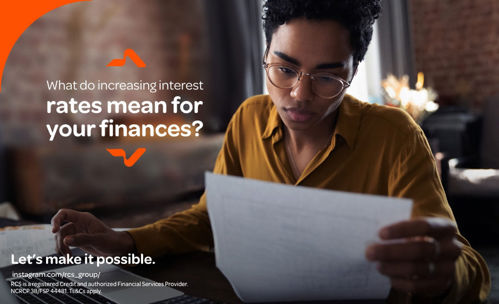Interest Rates have just gone up again. What does it mean and why is everything SO expensive?
17 AUGUST 2023
In this article we explain and offer some tips on how you can ensure you keep your financial goals in play and your debt in check – in spite of it all. The South African Reserve Bank recently announced that they will increase interest rates to help fight inflation – which is the higher prices that we are all paying right now when we buy essentials like food and petrol. Why is this all happening, and what does it all mean for you? We explain and offer some tips on how you can ensure you keep your financial goals in play and your debt in check.
The South African Reserve Bank recently announced that they will increase interest rates to help fight inflation – which is the higher prices that we are all paying right now when we buy essentials like food and petrol. Why is this all happening, and what does it all mean for you? We explain and offer some tips on how you can ensure you keep your financial goals in play and your debt in check.
Inflation – interest rate balance
“Stable, low-ish inflation is good for an economy. It is an indication of consumer demand, and the subsequent spending helps the economy grow. Inflation that rises too high, too fast does the opposite – goods become too expensive and spending, and economic growth stops,” says Tonia Pavlou, Deputy Chief Financial Officer at RCS. The South African Reserve Bank’s Monetary Policy Committee (MPC) uses an inflation target range to make sure that rising prices don’t have a negative effect on the economy. Their target range for inflation is 3% to 6%, and they prefer it to be around the midpoint at 4.5%. According to Stats SA, South Africa’s annual inflation number for March and April 2022 was 5.9%, above the midpoint and very close to the top of the target range. “With these numbers, the MPC has raised rates to curb inflation,” Pavlou says. The downside is that prices become too high, budgets become too stretched and there is no spending, no credit uptake and no economic growth, and for some consumers, severe financial distress.
What’s Happening
Recent fuel and food price increases have been driven by factors beyond our borders – Russia’s invasion of the Ukraine being the biggest reason. Put simply, this is because Russia is a major oil producer (used to make petrol) and the Ukraine is a big producer of vegetable oil and staple grains (like wheat), which are ingredients in many food products. The conflict itself and uncertainty around the situation has driven prices up. What’s more, the combination of actual food price increases and the cost of the fuel to transport food to our shelves has shot food prices up and made your groceries much more expensive. Because we have experienced a 30% increase in fuel prices in the last 12 months, with another potential big increase at the start of June, higher food prices and increases in electricity tariffs, your budget is, understandably, under pressure. In case it makes us feel better, many countries around the world are experiencing the same thing. Countries such as the UK and the US are experiencing their highest inflation in decades and their interest rates are also increasing to help keep this in check.
Why is this interest rate increase significant?
This most recent interest rate increase is the fourth in a row, which is a big change from just 12 months ago when interest rates were at low levels. To explain: “The prime interest rate was reduced to 7% at the start of the pandemic in 2020 to counter the impact on our economy of Covid-19 and lockdowns. The interest rate increased in November 2021, January and March 2022, and with the latest increase, consumers will be finding debt a lot more expensive,” Pavlou says. Although the individual rate increases are small and gradual, the effect is starting to add up.
Tips to keep your financial goals in play and your debt in check.
An advantage of having financial goals and a savings plan means that you can adapt the plan to situations like this. If you don’t have a plan yet and you have been feeling the pinch, it’s never too late to start.
- Draw up a revised budget for your household expenses and see where you could save on your day to day expenses and your monthly obligations.
- Look at your card and loan repayment amounts and factor in the extra costs that will come from the interest rate increase.
- Use any savings from your budget to increase your debt repayments so that you can pay off your debt faster.
- If you have been saving towards something, don’t stop even, if you are only able to save less.
- Ensure you keep up with your credit and store card payments. If you can afford to pay more than your minimum payment, always do it. Putting any extra money you have into paying off debt saves you money in the long run.
- The bonus of putting extra money into your store card or credit card is that you will have some credit available in the case of an emergency.
- If you are planning on taking out a loan to finance something bigger over a longer period, like a home renovation, ensure that you factor in additional interest rate increases into your affordability calculation.
MORE ARTICLES ABOUT
RELATED ARTICLES

Education
28 AUGUST 2025
SA Research: How Parents Impact a Child’s Financial Intelligence

Education
12 JUNE 2025
Cultivating Tomorrow's Leaders: Equipping Young South Africans for Life’s Challenges

Education
28 MARCH 2025
